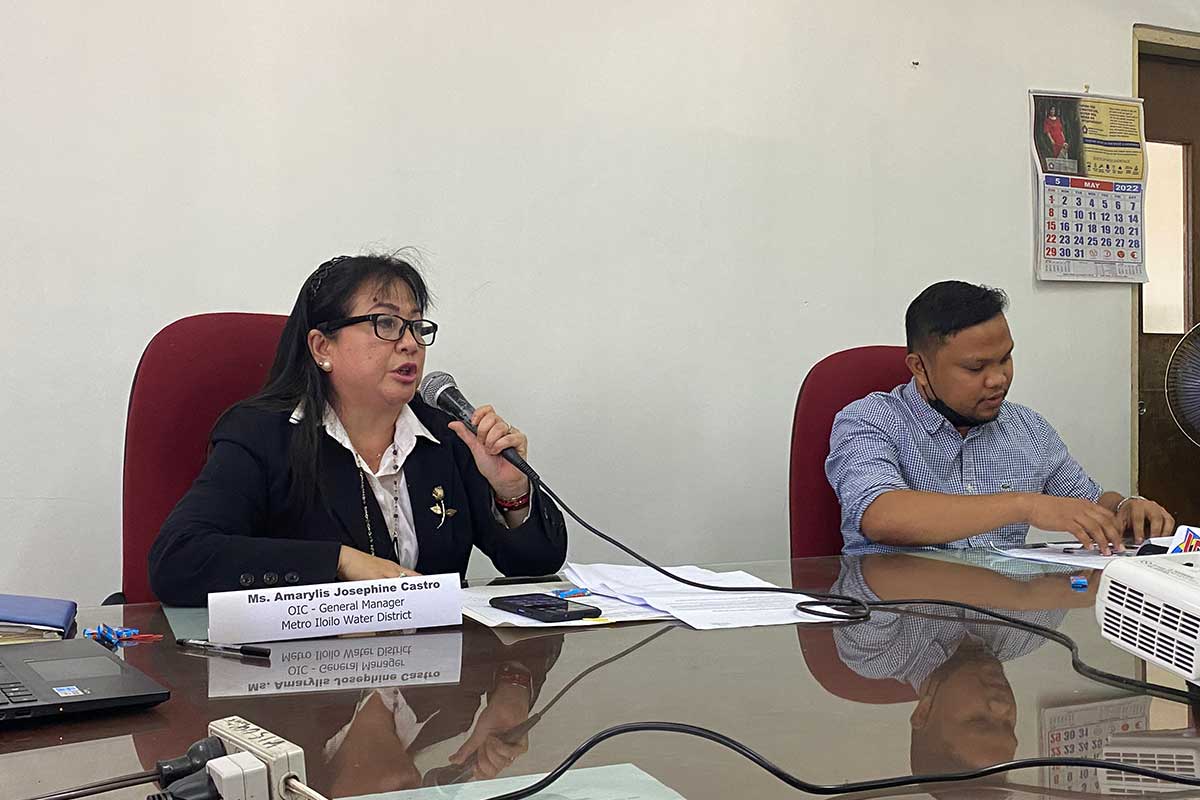
By Joseph B.A. Marzan
Around 20,000 water consumers will be affected as Metro Iloilo Water District (MIWD) and its joint-venture partner, Metro Pacific Iloilo Water (MPIW), on Thursday announced rotational water supply and interruptions in Iloilo City and neighboring towns starting May 16, 2022 due to the looming expiration of their contract with a bulk water provider.
MPIW will implement 12-hour rotational water supply interruptions from 3 a.m. to 3 p.m. in MIWD’s service areas in Arevalo, City Proper, La Paz, Lapuz, Molo, as well as selected parts of Jaro (Benedicto, Calubihan, Democracia, Desamparados, Dungon A and B, Fajardo, Javellana, Luna, M.H. Del Pilar, Montinola, Our Lady of Fatima, Lourdes, San Jose, San Pedro, San Vicente, Seminario, and Taytay Zone II) and Mandurriao (Diversion Road, Dungon, PHHC, Q. Abeto, R. Mapa, San Rafael, Santa Rosa, Tabucan, and Taft North).
Water supply will be available in these areas from 3:00 p.m. to 3:00 a.m.
Interruptions will also occur from 3 p.m. to 3 a.m. in other barangays of Jaro (Arguelles, Balagao, Balantang, Buhang, Buntatala, Camalig, Cuartero, Cubay, Fajardo, Lanit, Libertad-Santa Isabel, Lopez Jaena, Maria Cristina, M.V. Hechanova, Quintin Salas, Sambag, San Isidro, San Roque, Simon Ledesma, Tabuc Suba, Tacas, Tagbak, and Ungka), Mandurriao (Calajunan, Guzman, Hibao-an Norte, Hibao-an Sur, Oñate De Leon, and So-oc), and Leganes, Pavia, and Santa Barbara towns.
Water will be available in these areas from 3:00 a.m. to 3:00 p.m.
MPIW will deploy static tanks and water tankers to augment supply in some areas, with schedules to be announced via its social media channels.
In a press conference on Thursday, MIWD OIC General Manager Amarylis Castro cited the end of their 10-year agreement with Flo Water, one of its bulk water providers, on Sunday, May 15.
Flo Water provides 30,000 cubic meters of water to MIWD daily – 20,000 directly from the Florete owned firm and 10,000 through another bulk water provider, the Villar-owned Prime Water.
The other providers, Metro Iloilo Bulk Water and Mactan Rock, provide an aggregate supply of 50,000 cubic meters per day.
“The end of our contract is [on] May 15, 2022. This morning [May 12] we still had a meeting with Flo [Water], hoping that things would change, but nothing has changed. Still, [we] assure that negotiations are still open, if there are changes from their end, we are willing to talk and sit down,” Castro said.
PRICE HIKE
Castro said that they are still actively negotiating with Flo Water, which is seeking to increase its selling price from P11.72 per cubic meter to P25.00 per cubic meter under its new contract.
She said that they cited changes in riverbanks, increase in fuel prices, projected devaluation of pesos, interest rate increase, and climate change.
She also mentioned that the company’s offer was to progressively increase the rate up to P35.00 at the end of another 10-year contract.
“The [Government Procurement Policy Board] has allowed us to renew the contract at P11.72 [per cubic meter] for a year, we have already informed Flo Water on that matter, but they said that because of certain reasons, they cannot accept that price,” she stated.
“What we have in our minds, the MIWD and the MPIW, is the best interest of our consuming public. The [P11.72] I think it’s a reasonable price. We haven’t agreed upon that price, because we have an obligation to our customers that we will provide safe, reliable water, at the same time, affordable water,” said MPIW Chief Operating Officer Rob Cabiles.
Castro said that any price increase, as well as consideration of other water players, would have to go through the process with the Local Water Utilities Administration (LWUA).
Cabiles also advised businesses to store up on their water supply, especially for food and laundry service industries, as well as hospitals and government offices, which are heavily dependent on water.
“Our water tankers will cater mostly to the high-traffic commercial establishments, hospitals, and government agencies. We will also deploy static tanks for certain areas without water supply. These areas which will experience water supply during their window hours, I highly encourage them to store water so that they may be able to use during interruptions in their area,” he said.


















